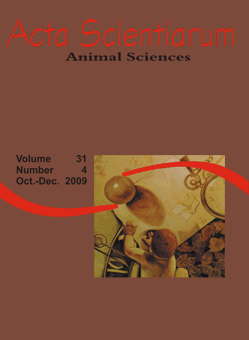<b>Dietary α-tocopheryl acetate on fillet quality of tilapia</b> - DOI: 10.4025/actascianimsci.v31i4.6929
Resumo
This work compared the effects of dietary α-tocopheryl acetate on storage life of tilapia fillets. Three experimental diets containing increasing α-tocopherol levels (zero, 100, and 200 mg kg-1) were used. The fish, with a mean initial weight of 184.23 ± 1.68 g, were fed diets for 63 days. After that period, they were slaughtered, filleted, and the fillets were grounded to accelerate lipid oxidation. Fish growth, survival, fillet yield, chemical composition and lipid oxidation of tilapia ground fillets were evaluated 0, 30 and 60 days after frozen storage. The results demonstrated that there was no significant difference between treatments for performance, and also, tocopherol did not influence the chemical composition values of fillets. Increased tocopherol levels in the feeds promoted a reduction in ground fillets lipid oxidation values.Downloads
DECLARAÇÃO DE ORIGINALIDADE E DIREITOS AUTORAIS
Declaro que o presente artigo é original, não tendo sido submetido à publicação em qualquer outro periódico nacional ou internacional, quer seja em parte ou em sua totalidade.
Os direitos autorais pertencem exclusivamente aos autores. Os direitos de licenciamento utilizados pelo periódico é a licença Creative Commons Attribution 4.0 (CC BY 4.0): são permitidos o compartilhamento (cópia e distribuição do material em qualqer meio ou formato) e adaptação (remix, transformação e criação de material a partir do conteúdo assim licenciado para quaisquer fins, inclusive comerciais.
Recomenda-se a leitura desse link para maiores informações sobre o tema: fornecimento de créditos e referências de forma correta, entre outros detalhes cruciais para uso adequado do material licenciado.









































